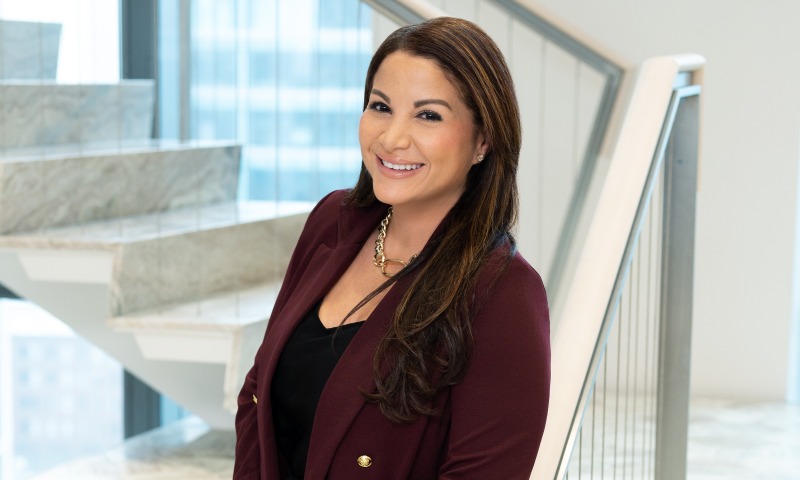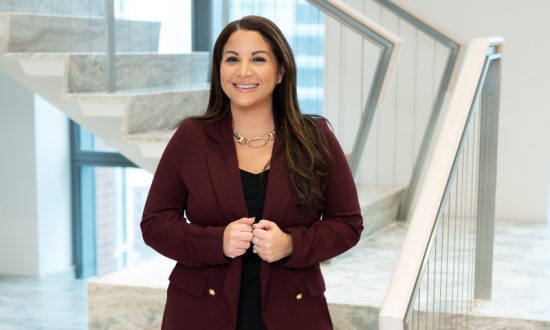Rosa J. Nuñez is responsible for developing, implementing, leading and championing proactive diversity, equity and inclusion initiatives and programs, in alignment with Foley Hoag’s overall strategic plans. She is a strategic partner to the firm’s Executive Committee and also a co-chair of the firm’s Diversity, Equity & Inclusion Committee. She has over 15 years of experience specializing in workplace diversity, equity, inclusion, employee engagement, workplace culture and community outreach programs. Her initiatives are centered on awareness building, recruitment, engagement, retention, thought leadership and external positioning.
Rosa’s work has been recognized nationally, including being named as one of one CIO Views Magazine’s 2023 DE&I Leaders to Follow, the 2022 50 most notable CDOs by COLOR Magazine, a 2021 Diversity Mentor of The Year by NY Moves Magazine, and 2021 Leading Latina by Hispanic Executive Magazine. She is also a National Board Member of INROADS, the oldest and largest non-profit organization creating pathways to careers for ethnically diverse high school and college students across the country.
In an exclusive chat with CXO Outlook Magazine, Rosa Nuñez shares her thoughts on the evolution of workplace diversity and inclusion in the corporate environment, her professional journey, her roles and responsibilities at Foley Hoag, and a lot more. Following are the excerpts from the interview.
According to you, how has diversity & inclusion evolved in the corporate environment? And what are the negative effects a lack of diversity can have on a corporate team?
Workplace Diversity, Equity & Inclusion (DE&I) has grown and changed significantly in corporations. When I started my career in the space around 15 years ago, not many organizations focused on intentional DE&I work, and those that did were mainly Fortune 500 companies. The work has evolved rapidly through the years with the shift in demographics coupled with increased societal, client, and employee expectations that have forced leaders to take a hard look at their policies, practices, and work environment. Moreover, DE&I, which was once seen as a sub-component under the human resources department, has now evolved into a core business function that large and small businesses alike have been aggressively investing in, with the killing of George Floyd being a pivotal moment in this culture shift.
Although much progress has been made over the past few years, more needs to be done to help eliminate the barriers that many from historically marginalized groups continue to face in the workplace and greater society. When a workplace is diverse, equitable, and inclusive, employees from all backgrounds feel empowered, seen, and valued, resulting in higher engagement, career success, and productivity.
On the contrary, a lack of diversity in a workplace can lead to various repercussions affecting not only the employees but also the growth and profitability of an organization. The effects of lack of diversity in the workplace can manifest in different ways, directly and negatively impacting employees’ satisfaction, productivity, and morale. Lack of aspects such as diverse perspectives, cultural competency, and investment in effective DE&I education can lead to significant illegal and unethical behaviors, including: discrimination, stereotyping, bias, and the workforce being resistant to change. Another critical point to add is that workplace DE&I is imperative to attract and retain talent, and clients now more than ever want to do business with organizations that share their same vision and goals around DE&I.
What are the three expectations you have for a diverse and inclusive workspace?
I have many expectations of any organization that says it is genuinely committed to fostering a diverse, equitable, and inclusive culture, starting with its commitment to DE&I coming and being modeled from the top. For meaningful and fundamental organizational change to happen – especially in the DE&I space – the actions and commitment must start at the top of the organization. Otherwise, not much can be accomplished. This is followed by how open and ready the organization is for this change and its willingness to do things differently, which can sometimes mean trying something very new and perhaps even being uncomfortable. Lastly, there needs to be a real commitment and investment in their DE&I leader/team and allocation of the necessary resources required to drive the initiatives forward.
Rosa, please brief us about the outset story of your career.
I always say that my DE&I career found me, as I never planned or imagined I would be where I am today – leading and driving DE&I at a major law firm. I graduated from undergraduate school hoping to work in visual arts – my career dream was to be an art director at a media/magazine company one day. However, life sometimes does not go as planned. After graduation, I found an entry-level opportunity at a global consulting firm as the most junior member of their back then newly-formed global DE&I team. This is where I fell in love with the space and work. After working at this organization for 10-plus years, I decided the time was right to take my passion and experience to other industries that may benefit from my skills. This is when I transitioned to doing DE&I work in media, marketing, advertising, and public relations before moving to the legal space.
About three years ago, when the opportunity to develop the DE&I Department at Foley Hoag presented itself in an unexpected turn of events, I left my role in the public relations industry and jumped with both feet in. I fell in love with the firm, the history, and most importantly, the people.

As the Chief Diversity, Equity & Inclusion Officer, what are some of the ways you champion diversity and inclusion at Foley Hoag?
In my role as the firm’s first Director of Diversity, Equity & Inclusion, and now Chief Diversity & Inclusion Officer, I am responsible for developing, implementing, leading, and championing proactive diversity, equity, and inclusion initiatives and programs aligned with Foley Hoag’s overall strategic plans. My work touches most business areas and centers around recruitment, retention, L&D, engagement, and external positioning. I aim to help Foley Hoag lead the pack in the DE&I space and continue to be recognized as an employer of choice. I closely collaborate with firm leadership and colleagues leading business services departments across our firm to identify, develop, and help implement different processes, practices, and initiatives to help us attract, retain, and engage the best possible talent across the industry – these include Legal Recruiting, Professional Development, Human Resource, Marketing, Business Development and more. The ultimate goal is to embed DE&I into the DNA of our firm.
You are also a National Board Member of INROADS. Can you please tell us about this oldest and largest non-profit organization and your role?
I have been a proud National Board Member of INROADS for close to four years now, and my work with this fantastic organization helps keep my cup full. It allows me to give back in the best possible way. INROADS is the oldest and largest non-profit organization creating pathways to careers for ethnically diverse high school and college students across the country. Access to career opportunities in many industries has historically been limited for members of traditionally marginalized groups, and INROADS is committed to changing that by providing access to top-tier paid internships, professional development, and mentorship opportunities. INROADS is helping to break down barriers and build a more equitable future for all. I am incredibly proud to be able to play a small role in the impact the organization continues to make across our nation.
What are some of the challenges you’ve encountered while working in the legal industry, and how have you overcome them?
It is no secret that the legal industry has lagged behind workplace DE&I efforts for quite some time and turning that around will not happen overnight or via a quick fix. However, we have seen a real push to increase diversity, equity, and inclusion across the industry in recent years.
Achieving greater diversity in this space requires intentionality coupled with bold and courageous efforts. The industry needs more leadership buy-in, significant efforts to eliminate bias in recruitment and promotion practices, aggressive investments to develop the next generation of attorneys from under-represented backgrounds, and an increased focus on education and awareness. Leaders must focus on changing the culture within their firms and highlight the wins these efforts achieve. It is essential to recognize that the path to an inclusive industry is not linear. There will be setbacks, but we must keep moving forward and staying focused to impact long-term change across the industry.
If you could give yourself one piece of advice at the start of your career, what would it be?
To make plans but to write them down in pencil! To be open and flexible to different paths and possibilities that life might have in store. Plans will usually change so be prepared! It’s called living life with open arms. You will end up where you are meant to be, so don’t stress about it.
In your opinion, what qualities constitute a good leader?
Often people rise to leadership because they have been successful at adding value and providing solutions. However, as we take on more leadership responsibilities, challenges become less straightforward and more ambiguous. At a certain point, we need to recognize and embrace the reality that we might not have all the answers and need others’ perspectives and expertise to help guide us. Leadership to me is about being open to listening to and learning from others, and creating the space for your team to explore and help you build the path ahead.
You have been a recipient of numerous awards and accolades over the years. Out of them, which achievement is special to you and why?
This is hard to answer because every award/recognition that I have been honored and blessed to receive throughout my career has a special value and place in my journey. They are all equally important to me, as they are a reminder of WHY I do the work I do and the impact it can have on others.
In your academic or work career, were there any mentors who have helped you grow along the way? What’s the best piece of advice you have ever received?
When I started in the DE&I space, a leader and someone I considered a mentor once told me that as I got ready to embark on my DE&I career, the journey would bring disappointments and, at times, knock me face down. Still, the key is not to lose sight of WHY I am doing this work and show up the next day as if I am winning. This advice has been front and center in my journey. Resilience and sustained actions are essential to affect the area of diversity, equity, and inclusion.
Consider someone at the start of their professional career, what advice would you offer them?
I will share a quote by Jane Goodall, an English primatologist and anthropologist, that I always keep top of my mind: “What you do makes a difference, and you have to decide what kind of difference you want to make.” I will add to that to never lose sight of your WHY – the core reason/principle behind why you do your work and allow this to keep you grounded and serve as a motivator to help you keep moving forward.


